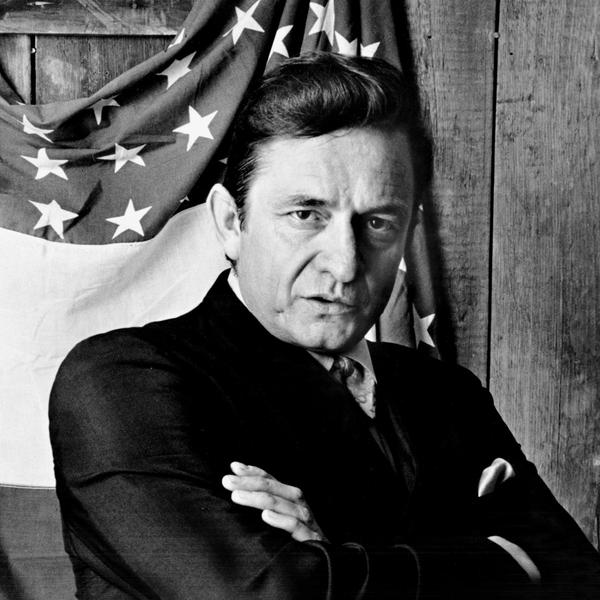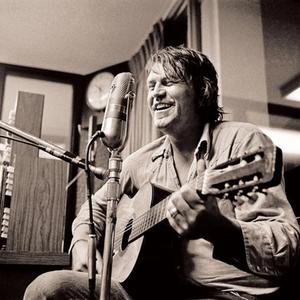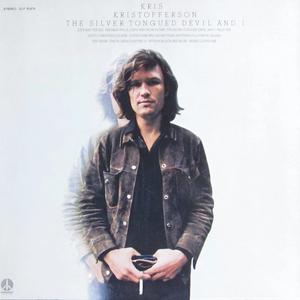




Link copied


Subscribe and listen to Holler's Playlist of The Best Johnny Cash Songs above.
Johnny Cash was one of those rarest of things: an artist who managed to crossover into all walks of life, somehow meaning something to almost everyone. It's something even rarer still for a country singer.
Born J.R Cash in Arkansas on February 26th 1932, he went on to become one of country music’s all-time greatest voices, with his distinctive bass-baritone and the Tennessee Three backing him up, recording songs right up until his death in 2003.
Holler takes a deep long look into the Man In Black’s illustrious catalogue of songs to pick out some of his very best.
Man In Black
Originally released on his 1971 album of the same name, Cash himself was known as "The Man in Black" for his distinctive style of on-stage outfits, and on one level, Johnny Cash’s theme song was a simple explanation for his preferred choice of outfit colour, but it also served as a protest statement against the treatment of the downtrodden and the poor by the wealthy classes, mass incarceration and the war in Vietnam.
Roseanne Cash told Mojo magazine that, to her, the song always “reflected the sadness, the convulsions, just that mythic dark night of the soul that he went through so many times."
Big River
Originally released as a single on Sun Records in 1958, 'Big River' typified the boom chicka boom sound that Cash's backing band, the Tennessee Three, were said to produce.
It climbed as high as number four on the Billboard country music charts and stayed on the charts for 14 weeks. The numerous cover versions over the years by everyone from Hank Williams Jr. and Bob Dylan to rockabilly band Beat Farmers and Lemmy from Motorhead are testament to the song's longevity and enduring appeal. Cash later included the song on his album The Songs That Made Me Famous.
Personal Jesus
Throughout his life Johnny Cash would often return to recording gospel songs and this unlikely Depeche Mode cover sits perfectly alongside old time spirituals like 'Softly and Tenderly' and 'The Old Rugged Cross.'
The song, written by Martin Gore of Depeche Mode, was originally inspired by Priscilla Presley's book Elvis And Me, where she described their relationship.
"It's a song about being a Jesus for somebody else, someone to give you hope and care," Gore said. "It's about how Elvis was her man and her mentor and how often that happens in love relationships - how everybody's heart is like a god in some way, and that's not a very balanced view of someone, is it?"
"I heard that as a gospel song," Cash explained to Mojo magazine in October 2013 about why he chose to cover it. "And if you think of it as a gospel song, it works really well. We didn't have any major disagreement over that song, I just heard that a couple of people had recorded it, the writer wanted me to try it, and I did, and I loved it. And I went for it."
Martin Gore himself doesn't recall asking Cash to record the song, saying the band didn't know about Cash's version until he included it on his 2002 album American IV, The Man Comes Around.
"I think when you're somebody of Johnny Cash's caliber, you don't ask for permission," he later joked to The Times newspaper.

Daddy Sang Bass
The sole single to be taken from Johnny Cash's 1969 concept album The Holy Land, 'Daddy Sang Bass' is an upbeat spiritual written by Carl Perkins that interpolates lines from the song 'Will the Circle Be Unbroken?'
According to Johnny Cash's book, The Man in Black, Cash overcame his amphetamine addiction by finding religion and then helped his friend and frequent tour-mate Perkins to overcome his own alcoholism. Inspired by both their journeys to sobriety, Perkins wrote 'Daddy Sang Bass' in 1967.
Cash says the line "Me and little brother will join right in there" was written about Cash's brother Jack, who died when Johnny was 12 years old.
According to Cash's autobiography, he, his mother, and Jack all had a sense of foreboding about that day; his mother urged Jack to skip work and go fishing with Cash, but Jack insisted on working as the family needed the money. Cash often spoke of the guilt he felt over the incident and how he looked forward to be reunited with him in the afterlife.
Starkville City Jail
This autobiographical song tells the story of one of Johnny Cash's brushes with the law when in the early morning of May 11th 1965, the singer was arrested for picking flowers in Starkville, Mississippi, following a show the night before. He famously performed the song to raucous cheers from his incarcerated audience in San Quentin prison and it was released in 1969 on the live album At San Quentin.
He was charged with public drunkenness after being caught in a local resident's garden picking flowers. “I was walking down the street and going to get me some cigarettes or something, about two in the morning, after a show”, he tells the crowd on Johnny Cash At San Quentin. “I reached down and picked a dandelion here and a daisy there as I went along”. A passing police patrol car saw him, and he was arrested and spent the night in jail.
Myth has it that Cash shared his cell that night with a 15-year-old boy called Smokey Evans, who kicked the wall so hard throughout the night that he broke his toe. Before he was let out in the morning, Cash took off his shoes and gave them to the boy, saying, "Here’s a souvenir. I’m Johnny Cash."
I've Been Everywhere
One of the best examples of how Johnny Cash was capable of taking any song and reinterpreting it and completely reimagining it for the listener, like 'Personal Jesus,' 'One' started off life as a rock song.
originally a included on s a song by Irish rock band U2's seventh album, Achtung Baby, according to Bono, who wrote the lyrics, there are two specific stories intertwined in 'One.' The first is a son telling his father - a very religious man - that he's gay, while the second is a woman in a sexless marriage who has been caught cheating.
"You're overhearing conversations, and you draw your own conclusion," Bono wrote in his memoir Surrender, about the song, that takes the form of an argument between two characters. "All the intimacies from different rooms entwine into one story about how people are more the same than they are different. But still, they remain different."
Included on American III: Solitary Man in 2000, Cash's gruff baritone transformed the powerful rock ballad into a desperate plea for love and understanding in a turbulent world.
Five Feet High And Rising
Cash wrote this song as a first-person account of the 1937 Mississippi flood that, as a four-year-old, he got caught up in along with his family. It describes them having to leave their home to escape the water rising an inch at a time, surrounded by chickens in willow trees and cows in water “up to their knees”.
The song was recorded by Cash on March 12, 1959 for his third Columbia album and released as a single on in July of that year with 'I Got Stripes' on the flip side. It peaked at number 14 on the Hot Country Singles chart but did manage to dent the Billboard Hot 100, a sign of the crossover success Cash would enjoy throughout his career.
He famously performed the song on Sesame Street with Biff, who used square-foot boxes to illustrate the song's lyrics and it also inspired the title of De La Soul’s album 3 Feet High And Rising, after they sampled the song on ‘Magic Number’.
Ragged Old Flag
Cash wrote the title track to his 1974 album in the wake of President Nixon's resignation while he was in Binghamton, New York. Cash, who had publicly supported Nixon, had started to feel some doubts because of the president’s policies regarding the Vietnam War and growing divisions in the country following the Watergate scandal.
With typical a typically complex patriotic tone, the spoken word song recounts a conversation between Cash and an elderly gentleman in a town square somewhere. As they look up at an American flag flying, they run through everything that this symbol of US history has had to go through over time.
At the first Americana Music Awards in September 2002, Cash performed the song, adding references to Operation Desert Storm and Afghanistan.
"I thank God for all the freedom we have in this country, I cherish them and treasure them," he told the audience, introducing the performance. "Even the right to burn the flag. We also got the right to bear arms and if you burn my flag - I'll shoot you. But I'll shoot you with a lot of love, like a good American".
The One On The Right Is On The Left
Written by country legend “Cowboy” Jack Clement, this song from Johnny Cash's 1966 novelty album Everybody Loves A Nut pokes fun at the supposed dangers of mixing politics with traditional roots music. It recounts the story of a talented “pickin' singin' folk group” travelling all over America, whose political differences lead to in-fighting and the group eventually breaking up.
One Piece At A Time
One of Johnny Cash’s most well-loved anti-authority songs, the title track to his 1976 album, 'One Piece At A Time' is a smirking satire on the downsides of the division of labour. In the song he tells the story of a worker working at the General Motors car plant in Michigan, fitting wheels onto Cadillacs, all the time knowing he will never be able to afford one of his own.
He devises a plan with a co-worker to “steal” a whole car by taking home bits of a Cadillac one part at a time. After doing this for 25 years, they finally have all the parts needed for a complete Cadillac, but unfortunately, because it’s taken them so long, all the parts are from different years’ models.
It Ain't Me Babe
Originally written and recorded by Bob Dylan, Cash stepped up with his future wife June Carter to reimagine it as a duet for their Orange Blossom Special album in 1965.
As legend has it, Cash had met Dylan briefly backstage during one of his performances at The Gaslight Café, and when they met up again after a show in Newport, trading songs in a motel, one of those songs was ‘It Ain’t Me Babe’, which went on to be a classic in any Johnny Cash live show.
Don't Take Your Guns To Town
Released in 1958 as the first single from The Fabulous Johnny Cash, this booming gunfighter ballad tells the story of a young cowboy named Billy Joe who, despite his mother advising him not to, leaves his farm for a night out on the town and takes his guns with him. As is often the case, his mother was right, and he gets into a gunfight at a saloon and ends up being shot and killed.
Jackson
Written by Billy Edd Wheeler and Jerry Leiber, this feisty duet had already been a hit for Lee Hazelwood and Nancy Sinatra in 1967. Johnny Cash and June Carter took it to the number two spot that same year and won a Grammy award with it a year later.
The tale of a married couple who got hitched too hastily and now daydream about going to the mythic town of Jackson to get away from each other, the song originally ended with the first verse before Wheeler suggested to Leiber that they start the song with it instead.
The Ballad Of Ira Hayes
Never afraid to align himself with the marginalised and the unsung, Cash released a whole album of songs, Bitter Tears: Ballads Of The American Indian, about the harsh and unfair treatment of the indigenous people of North America in 1964.
This song, written by folk singer Peter La Farge, tells the story of Ira Hayes, one of six US marines who became famous for raising the flag on Iwo Jima in World War II, only to return home to American soil after the war to be treated with contempt and rejection by society.
Folsom Prison Blues
Cash managed to squeeze two of his trademark songwriting themes - trains and prisons - into one song with this cut from his 1955 debut studio album Johnny Cash With His Hot And Blue Guitar.
Recorded in Sun Studios in Memphis and produced by Sam Phillips, Cash opened almost all of his concerts with the song, including the show he recorded in Folsom Prison itself, where he gets the loudest cheer of the night for the line, “I shot a man in Reno, just to watch him die".
His live recording from At Folsom Prison reached number one on the US Top County Albums chart, winning him two Grammy awards when it was released as a single in 1968.
A Boy Named Sue
Another hit taken from one of Cash’s legendary prison recordings, this song, written by the poet and children's author Shel Silverstein, became his highest-charting single when the recording of it from At San Quentin was released in 1969.
In his autobiography, Cash describes how he’d only just been given the full song, after Silverstein had played him it one night at a guitar pull, and only read over it a couple of times before he played it in front of an audience in San Quentin prison. In live footage of the show, he can be seen checking a piece of paper for the words.
Sunday Morning Coming Down
Probably the greatest song ever about a hangover, it was written by Kris Kristofferson, and as legend has it Kristofferson delivered the demo tape to Cash by landing his National Guard helicopter in Cash’s front yard with the tape in one hand and a beer in the other.
Cash was famously asked by the producers at ABC to change the line "I'm wishing Lord that I was stoned" when he performed it on the Johhny Cash Show TV series, but he refused to comply, making a point of putting particular emphasis on the word “stoned” when he sang it.
Ring Of Fire
Written by Merle Kilgore with June Carter about her burgeoning affection for Cash, it was originally recorded by June’s sister Anita Carter. After hearing Anita's version, Cash said he had a dream where he heard the song accompanied by "Mexican horns", and six months later he recorded it himself, complete with a mariachi horn section and Mother Maybelle and the Carter singers singing back up. They took it all the way to number one on the Billboard Hot Country Singles chart.
Credited to June Carter and Merle Kilgore, Johnny Cash's first wife Vivian contests that the song was written by her then husband in her 2007 autobiography.
"One day in early 1963, while gardening in the yard, Johnny told me about a song he had just written with Merle Kilgore and Curly Lewis while out fishing on Lake Casitas. 'I'm gonna give June half credit on a song I just wrote,' Johnny said. 'It's called "Ring of Fire."' 'Why?' I asked, wiping dirt from my hands. The mere mention of her name annoyed me. I was sick of hearing about her. 'She needs the money,' he said, avoiding my stare. 'And I feel sorry for her.'"
Whether or not June Carter wrote the song or not, it has gone on to be seen as signifying the start of June Carter's relationship with Johnny Cash.
"The song is about the transformative power of love and that's what it has always meant to me and that's what it will always mean to the Cash children," Rosanne Cash said of the song.
Hurt
Rick Rubin and Cash had already recorded three hugely successful albums in the American Recordings series, when Rubin suggested covering Trent Reznor’s ‘Hurt’ for the fourth collection, The Man Comes Around.
Cash was suffering from autonomic neuropathy brought on by diabetes by the time he recorded the song, and his health was visibly failing. The accompanying video, directed by Mark Romanek, featured a noticeably frail Cash performing the song in the derelict House Of Cash museum, surrounded by his memories, with June Carter Cash watching over him.
It was made all the more heartbreakingly poignant when June died three months later in May 2003, and Johnny followed her in September of that same year.
I Walk The Line
"I keep a close watch on this heart of mine," sings Cash in one of his most well-loved songs; a hopeful promise to remain faithful to his first wife, Vivian, while he was on the road, trying to avoid the temptations of a touring musician.
Originally released in 1956 on Sun Records, it went on to become his first country number one single and even managed to make an impression on the pop charts. The song provided the title for the Johnny Cash and June Carter biopic starring Reese Witherspoon and Joaquin Phoenix as the star-crossed country lovers.
~~
For more on Johnny Cash, see below:





